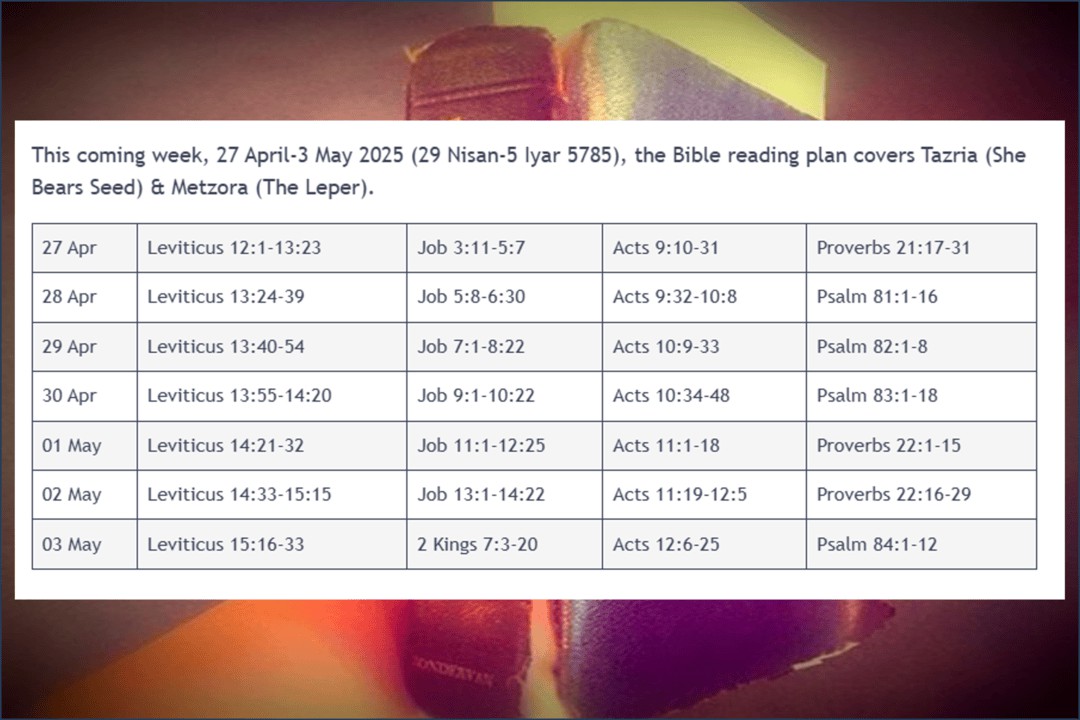Watch
Events
Articles
Market
More
This coming week, 27 April-3 May 2025 (29 Nisan-5 Iyar 5785), the Bible reading plan covers Tazria (She Bears Seed) & Metzora (The Leper).
https://thebarkingfox.com/2025..../04/25/weekly-bible-




This coming week, 27 April-3 May 2025 (29 Nisan-5 Iyar 5785), the Bible reading plan covers Tazria (She Bears Seed) & Metzora (The Leper).
https://thebarkingfox.com/2025..../04/25/weekly-bible-




Shalom. Here's First Fruits Ministries' bulletin for the upcoming Sabbath celebration on 4/26/2025: https://firstfruits.cc/blog/20....25/04/25/sabbath-bul



What's the big deal about red cows in Israel? Adam Eliyahu Berkowitz explains that in his new book, Return of the Red Heifers: Paving the Road to Redemption.
This really is a big deal because it brings Israel much closer to restoring the Temple service in Jerusalem just as promised in the Bible. The problem is, this is a subject very few people understand. That lack of understanding, both among Jews and Christians, motivated Eliyahu to write the book as a means to answer misinformation with the truth. He shares much of that truth in this interview - especially why the restoration of the Temple is important to Christians and the role we have to play in that process.
If you're not quite sure what a red heifer is, or whether a new Temple in Jerusalem is a good thing, this conversation is something you might want to hear!
https://www.buzzsprout.com/229....2194/episodes/170111



What's the big deal about red cows in Israel? Adam Eliyahu Berkowitz explains that in his new book, Return of the Red Heifers: Paving the Road to Redemption.
This really is a big deal because it brings Israel much closer to restoring the Temple service in Jerusalem just as promised in the Bible. The problem is, this is a subject very few people understand. That lack of understanding, both among Jews and Christians, motivated Eliyahu to write the book as a means to answer misinformation with the truth. He shares much of that truth in this interview - especially why the restoration of the Temple is important to Christians and the role we have to play in that process.
If you're not quite sure what a red heifer is, or whether a new Temple in Jerusalem is a good thing, this conversation is something you might want to hear!
https://www.buzzsprout.com/229....2194/episodes/170111



Not many of you should become teachers, my brothers, for you know that we who teach will be judged with greater strictness.
James 3:1 ESV
You're not likely to be blasted like Nadab and Abihu since the Ark of the Covenant isn't around these days, but if you're going to be a teacher of God's people, then you need to hold yourself to a higher standard than you hold everyone else. You must be harder on yourself, because God will also be harder on you. It will be better for you to self-discipline than to be God-disciplined.



I do not ask for these only, but also for those who will believe in me through their word...
John 17:20
This statement seems to refute a strictly Calvinist interpretation of this passage. The people Yeshua prayed for here would be brought to belief through the testimony of the disciples, not through prior election of God.
Otherwise, there would be no point in praying "also for those". In Calvinist soteriology, the number of the elect is already set and cannot be changed by any amount of prayer or evangelism.



I glorified you on earth, having accomplished the work that you gave me to do.
John 17:4
The heart of every ministry is to glorify the Father. If you end this life only having accomplished one thing, bringing honor and glory to the name of YHWH, then you have done more than most kings and philosophers.


